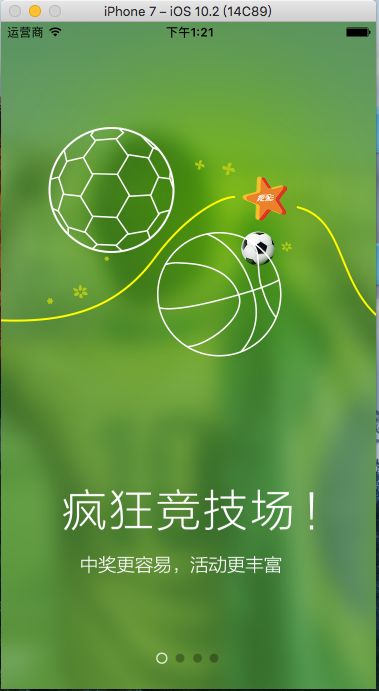本文主要讲解使用UICollectionView来完成应用引导页的实现
应用引导页在项目中的使用还是比较频繁的,一般用于版本更新后进入新版本的介绍,现在对于引导页的实现方式一般为两种:UICollectionView和UIScrollView。这两者在使用上差别不大,UICollecitonView比UIScrollView多了一个cell重用,以及每个Cell都是通过数据源方法设置。而UIScrollView则是一次性完成整个scrollView的初始化。本文主要讲解UICollecitonView的实现方法,如果您想用UIScrollView实现的话,也可以参照本文讲述的方式进行实现。
首先我们使用UICollectionViewController来实现,添加图片元素
public partial class ViewController : UICollectionViewController
{
UIImageView bigView;
UIImageView largeTxtView;
UIImageView smallTxtView;
float pageNumber;
static NSString reuseIdentifier = new NSString("GuideCell");
public ViewController()
{
}
public ViewController(UICollectionViewFlowLayout layout) : base(layout)
{
}
protected ViewController(IntPtr handle) : base(handle)
{
// Note: this .ctor should not contain any initialization logic.
}
public override void ViewDidLoad()
{
base.ViewDidLoad();
this.CollectionView.RegisterClassForCell(typeof(MYGuideViewCell),reuseIdentifier);
//设置分页样式
this.CollectionView.PagingEnabled = true;
//取消水平滚动条
this.CollectionView.ShowsHorizontalScrollIndicator = false;
//取消弹性效果
this.CollectionView.Bounces = false;
UIImageView blView = new UIImageView(UIImage.FromBundle("guideLine"));
CGRect rectbl = blView.Frame;
rectbl.X = -150;
blView.Frame = rectbl;
Console.WriteLine(blView.Frame);
this.CollectionView.AddSubview(blView);
bigView = new UIImageView(UIImage.FromBundle("guide1"));
Console.WriteLine(bigView.ContentMode);
Console.WriteLine(bigView.Frame);
this.CollectionView.AddSubview(bigView);
largeTxtView = new UIImageView(UIImage.FromBundle("guideLargeText1"));
CGRect rectlarge = largeTxtView.Frame;
rectlarge.X = 27.5f;
rectlarge.Y = (System.nfloat)(this.CollectionView.Frame.Height * 0.7);
largeTxtView.Frame = rectlarge;
this.CollectionView.AddSubview(largeTxtView);
smallTxtView = new UIImageView(UIImage.FromBundle("guideSmallText1"));
CGRect rectsmall = smallTxtView.Frame;
rectsmall.X = 27.5f;
rectsmall.Y = (System.nfloat)(this.CollectionView.Frame.Height * 0.8);
smallTxtView.Frame = rectsmall;
this.CollectionView.AddSubview(smallTxtView);
bigView.Layer.BorderColor = UIColor.Blue.CGColor;
bigView.Layer.BorderWidth = 2.0f;
// Perform any additional setup after loading the view, typically from a nib.
}
注意事项:
1.在使用UICollectionViewController和使用UITableViewController使用的注意情况一样,我们新建一个ViewController后,修改父类为UICollectionViewController,还需要修改相应的.xib文件中的UIViewController改为UICollectionViewController。
2.修改UICollectionViewController的重用标识符和绑定的.cs文件。
3.在ViewDidLoad中注册相应的cell,可以直接代码实现也可以使用.xib文件实现。
接着我们自定义CollectionView的cell
using System;
using UIKit;
namespace test_jianshu
{
public class MYGuideViewCell : UICollectionViewCell
{
private UIImage image;
private UIImageView imageView;
public UIImage Image
{
get
{
return image;
}
set
{
this.ImageView.Image = value;
image = value;
}
}
private UIImageView ImageView
{
get
{
if (imageView == null)
{
imageView = new UIImageView();
imageView.Frame = new CoreGraphics.CGRect(UIScreen.MainScreen.Bounds.Location,UIScreen.MainScreen.Bounds.Size);
this.AddSubview(imageView);
}
return imageView;
}
set
{
imageView = value;
}
}
protected MYGuideViewCell(IntPtr handle) : base(handle)
{
}
}
}
然后实现CollectionView的数据源代理方法
public override nint NumberOfSections(UICollectionView collectionView)
{
return 1;
}
public override nint GetItemsCount(UICollectionView collectionView, nint section)
{
return 4;
}
public override UICollectionViewCell GetCell(UICollectionView collectionView, NSIndexPath indexPath)
{
MYGuideViewCell cell = (MYGuideViewCell)collectionView.DequeueReusableCell(reuseIdentifier,indexPath);
string imageName = string.Format("guide{0}Background568h", indexPath.Row + 1);
//NSString imageName = NSString.LocalizedFormat("guide%zdBackground", indexPath.Row + 1);
cell.Image = UIImage.FromBundle(imageName);
//cell.BackgroundColor = UIColor.Red;
return cell;
}
接着我们重写滑动结束执行的方法
public override void DecelerationEnded(UIScrollView scrollView)
{
nfloat offsetX = scrollView.ContentOffset.X;
int page = (int)(offsetX / UIScreen.MainScreen.Bounds.Width);
if (pageNumber < page)
{
//向左滑动
CGRect rectbl = bigView.Frame;
rectbl.X = offsetX + this.CollectionView.Frame.Width;
bigView.Frame = rectbl;
CGRect rectlarge = largeTxtView.Frame;
rectlarge.X = offsetX + this.CollectionView.Frame.Width;
largeTxtView.Frame = rectlarge;
CGRect rectsmall = smallTxtView.Frame;
rectsmall.X = offsetX + this.CollectionView.Frame.Width;
smallTxtView.Frame = rectsmall;
//bigView.x = offsetX + this.CollectionView.Frame.Width;
//largeTxtView.x = offsetX + this.CollectionView.Frame.Width;
//smallTxtView.x = offsetX + this.CollectionView.Frame.Width;
}
else
{
//向右滑动
CGRect rectbl = bigView.Frame;
rectbl.X = offsetX - this.CollectionView.Frame.Width;
bigView.Frame = rectbl;
CGRect rectlarge = largeTxtView.Frame;
rectlarge.X = offsetX - this.CollectionView.Frame.Width;
largeTxtView.Frame = rectlarge;
CGRect rectsmall = smallTxtView.Frame;
rectsmall.X = offsetX - this.CollectionView.Frame.Width;
smallTxtView.Frame = rectsmall;
//self.bigView.x = offsetX - self.collectionView.width;
//self.largeTxtView.x = offsetX - self.collectionView.width;
//self.smallTxtView.x = offsetX - self.collectionView.width;
}
string bigImageName = string.Format("guide{0}", page + 1);
string largeImageName = string.Format("guideLargeText{0}", page + 1);
string smallImageName = string.Format("guideSmallText{0}", page + 1);
bigView.Image = UIImage.FromBundle(bigImageName);
largeTxtView.Image = UIImage.FromBundle(largeImageName);
smallTxtView.Image = UIImage.FromBundle(smallImageName);
UIView.Animate(0.25, () => {
CGRect rectbl = bigView.Frame;
rectbl.X = offsetX ;
bigView.Frame = rectbl;
CGRect rectlarge = largeTxtView.Frame;
rectlarge.X = 27.5f+offsetX ;
largeTxtView.Frame = rectlarge;
CGRect rectsmall = smallTxtView.Frame;
rectsmall.X = 27.5f + offsetX ;
smallTxtView.Frame = rectsmall;
});
pageNumber = page;
}
在这里实例代码中的耦合性太高,对于设置frame的时候重复代码太多,这里在OC中使用分类就能实现,在Xamarin中也有分类的相应实现方式,但是却不能在分类中使用this获取到相应的属性,这里就没用分类实现。可以自己再去试试用分类实现的方式。这里我给出OC中分类的代码,大家可以自动转换分类。
声明x,y,width,height四个属性,只是用其get和set方法
#import "UIView+Frame.h"
@implementation UIView (Frame)
-(void)setX:(CGFloat)x
{
CGRect rect = self.frame;
rect.origin.x = x;
self.frame = rect;
}
-(CGFloat )x
{
return self.frame.origin.x;
}
-(void)setY:(CGFloat)y
{
CGRect rect = self.frame;
rect.origin.y = y;
self.frame = rect;
}
-(CGFloat )y
{
return self.frame.origin.y;
}
-(void)setWidth:(CGFloat)width
{
CGRect rect = self.frame;
rect.size.width = width;
self.frame = rect;
}
-(CGFloat )width
{
return self.frame.size.width;
}
-(void)setHeight:(CGFloat)height
{
CGRect rect = self.frame;
rect.size.height = height;
self.frame = rect;
}
-(CGFloat )height
{
return self.frame.size.height;
}
@end
在此处实例没有添加按钮,没有附加获取版本号的部分,这里你可以自行添加。

